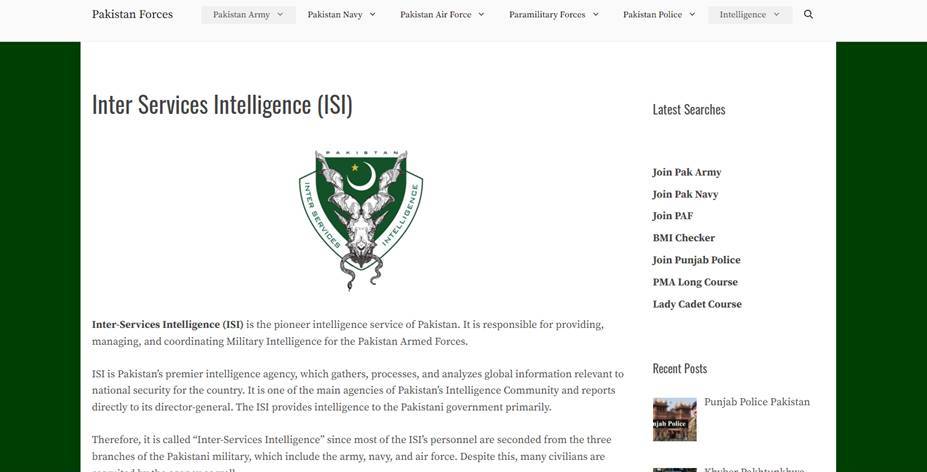 Pakistan's Inter Services Intelligence (ISI) website.
Pakistan's Inter Services Intelligence (ISI) website.
[This is an excerpt from an article in The Round Table: The Commonwealth Journal of International Affairs. Opinions do not reflect the position of the Round Table editorial board.]
When Lt General Faiz Hameed, Pakistan’s spy agency chief until recently, allowed himself to be photographed at the Serena Hotel in Kabul shortly after the capital fell to the Taliban, and just before an interim government emerged, the regional response was scathing.
In India, especially, the visit was said to show that Afghanistan was now a puppet state, the Taliban a wholly owned Pakistan subsidiary. Officials and journalists framed the new order as a spectacular victory for the Inter Services Intelligence directorate (ISI), Pakistan’s notorious spy agency, perhaps as significant as India’s in East Pakistan in 1971. Afghanistan, which had tilted to the West, where women were folded into government and society, was now heading back towards a dour Islamism, orchestrated by a pathological agency that had spent two decades duping the US.
But this is an extraordinary partial reading, seen through the lens of South Asian conflict and India’s missteps. It is true the ISI endured the last two decades, but it never strayed from its stated position of demanding a government in Kabul which was friendly with Rawalpindi. Along the way the ISI punished, manipulated, and courted Taliban commanders and religious scholars, jailing some, torturing others, and protecting networks that were allied to Rawalpindi. But what internal intelligence from Pakistan also shows is that this path was always treacherous because the ISI’s influence was only piecemeal and the agency did not have the bandwidth or capability to encompass the entire country, while also concentrating on the eastern border with India, and attempting to secure its frontier with Iran. ISI frequently ‘ran out of gas’ and ideas.
What Rawalpindi did see over the last two decades was the Bush–Cheney ‘war on terror’ floundering, spectacularly and grimly, with, we now know, almost one million dying and eight trillion dollars spent over the last two decades, to achieve only limited results.
Along the way, justice was denuded, the rules-bound system frayed. One year before the 11 September 2001 attacks, the growing al Qaeda threat was deliberately obscured by the CIA, with critical details about the transit of two insurgents from Malaysia to California suppressed so as to nullify competition from the FBI. After 9/11, vengeful officers at Langley lobbied the White House and the Department of Justice to allow them to recoup their losses with a new ‘gloves off’ plan that would prevent an alleged second wave of attacks on the US by vanishing suspects into foreign off-the-books black sites.
The use of torture then made prosecutions of suspects difficult, as affidavits had been coerced, leading to a 20-year legal farce where Bush’s push for justice would deny that very thing to the families of the September 11 victims. Twenty years on, there is still no ‘9/11’ trial.
America and its allies in the UK, France and Germany, and other smaller European powers, supported almost all of these actions – as did Pakistan – and are to blame also for the circularity in Kabul: it falling, and a new city-state rising, which was sold as Afghanistan, but not to the people themselves.
Adrian Levy & Cathy Scott-Clark – Journalists and Authors (Spy Stories: Inside the Secret World of the RAW and the ISI, Juggernaut, 2021), London, UK.



